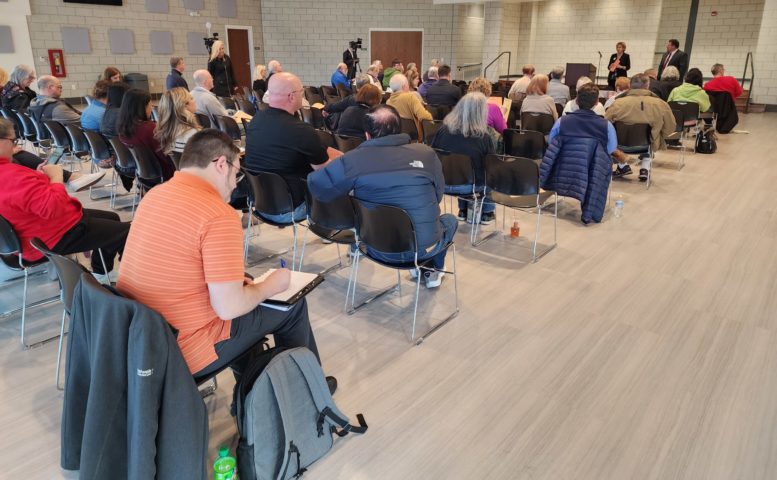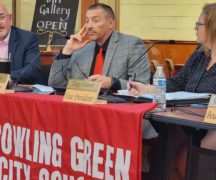By JAN LARSON McLAUGHLIN
BG Independent News
Talk about a high pressure interview in front of a potentially tough crowd. Each of the three finalists for Bowling Green City Schools superintendent had a chance to convince the community Wednesday evening that they were the best person for the job.
They all brought different backgrounds, skills and philosophies to the table. One has experience as a superintendent and teaches school finances. One has experience managing school facilities. And one talked very passionately about students of all abilities.
Two are graduates of BGHS and want to come home to help the district. All have experience in the classroom.
All spoke of their successes helping their current districts pass levies and bond issues. And all said they were the person to heal the Bowling Green district.
Each of the three was given 45 minutes to introduce themselves and then answer questions. Community members were asked to write comments about the candidates – which the school board will review on Thursday as the finalists meet with various school groups.
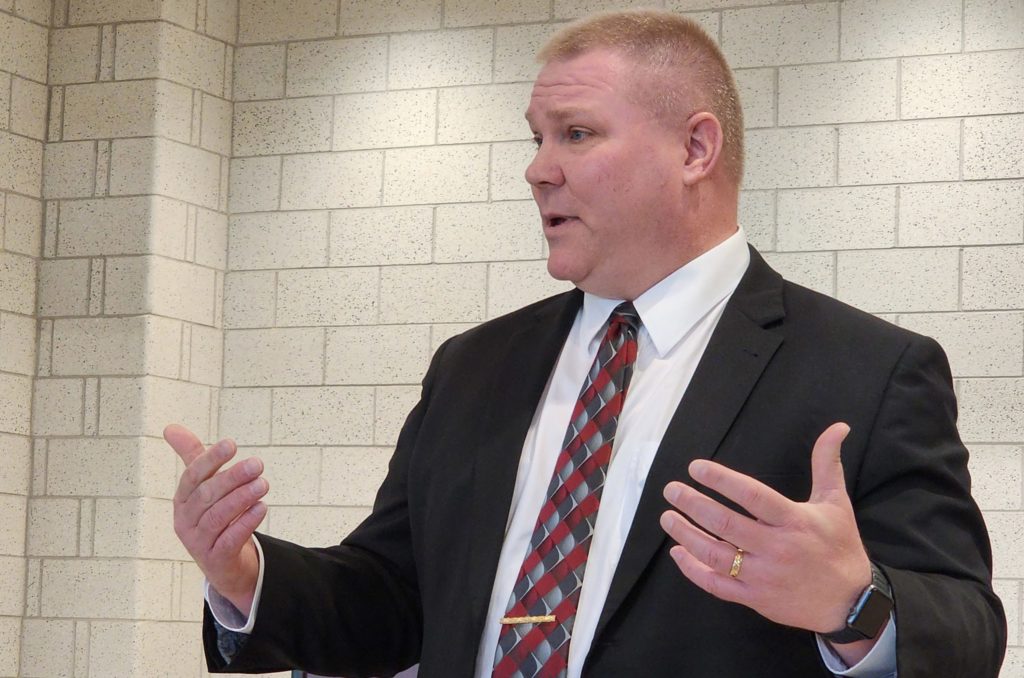
The first to speak Wednesday evening was Ted Haselman, the current superintendent at Pike-Delta-York Schools. Prior to that, he taught computer classes in Perrysburg for 13 years, then served as principal at Swanton Middle School for five years.
Haselman has been offered another five-year contract at Pike-Delta-York, but believes he can bring the same success to Bowling Green that was achieved at his current post.
“I’m looking for a professional challenge,” he said.
When he was first hired at Pike-Delta-York, Haselman said the district was in poor financial shape and suffered from lack of community trust.
“I can tell you eight years later it’s completely different.”
District voters have passed a levy for new money, and the divisions have been healed.
“The community is the school and the school is the community,” he said.
That change was achieved by listening and asking questions. “Then you have to do what you say.”
His leadership style involves visibility – in the school buildings and in the community. “I want to be extremely visible.”
Communication plays a big role – sharing the good news about the district.
“Sharing the positives of what our district does,” he said. “If we don’t share that information with the community, that space will be filled with other conversations.”
Haselman also teaches school finance and resources as an adjunct at University of Findlay. “I know school finance very, very well.”
When asked about the balance between income taxes and property taxes, Haselman said it’s ideal to use both, “so everyone is paying their fair share for schools.”
Transparency is vital, he said when one community member accused the BG district of not sharing details of its finances.
“Nobody likes paying more money,” he said. “Ultimately we’re asking our constituents to pay additional funds.”
Haselman said in his experience, some people will vote in favor of any school levy, and others will vote against them all. The key is to reach the people who have open minds.
When asked to share a curriculum challenge he has handled, Haselman said Pike-York-Delta created a two-year kindergarten program when it realized that many of its kindergartners were starting school unprepared. That has made a huge difference, he said.
When asked how his district handled COVID, Haselman said students came back to the classroom in August of 2020. “They knew the importance of kids being in school,” he said of teachers.
As for drug testing, Haselman said Swanton tests students for drugs, but Pike does not. The testing “gave kids an out,” for not partaking with friends, he said. Bowling Green is one of the few districts in the area that does not perform drug testing.
Haselman touched on the effort at the state level to support private over public education. “We feel it everyday.”
He addressed the disconnect between state rules and making students feel welcome and supporting teachers as they face new curriculum restrictions.
“You have to create a culture of acceptance, no matter what the legislature says.”
As for the working relationship between a superintendent, faculty, staff and the board, Haselman said there must be “a relationship of respect. We’re in this together.”
When asked how long he would commit to the BG school district, Haselman said he has nine years till retirement.
“I will be here for the long haul to take these challenges on,” he said. “I’ve done my research. I’ll take these challenges head on. This is not going to be a quick turnaround – but it can be done.”
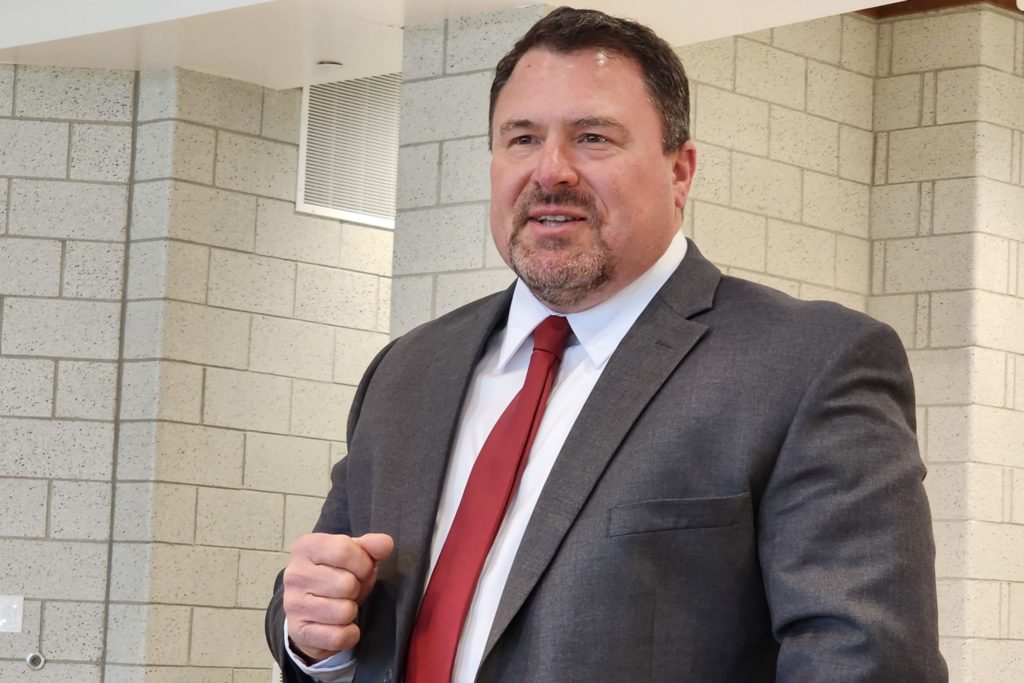
Next up was Bruce Otley, a 1990 graduate of BGHS and 1995 graduate of BGSU – who entered with a loud “Hello BG.” He began his education career as a high school social studies teacher for seven years. He then served as a principal for 17 years, and has been director of operations for Liberty-Benton Schools for four years.
As a “native son,” Otley said he would be devoted to the district.
“No one will work harder. No one will love the job more,” he said. “It’s more than a job to me – it’s more like a mission.”
As Liberty-Benton operations director, Otley acts as assistant superintendent, business manager, and is responsible for school facilities.
In 2019, Liberty Benton passed a bond issue to build a new pre-kindergarten to eighth grade school. The key was voter turnout, Otley said. He has studied the votes in BG City School District’s recent building issues, precinct by precinct.
“I think there are a lot of ‘yes’ voters out there who just haven’t yet been motivated to get to the polls,” he said.
Passage of bond issues takes a robust campaign with a clear message of why voters should support the issue.
“There are ways to do that,” he said, pointing to Liberty-Benton’s success.
Trust is another key issue, and that requires honesty, transparency and integrity.
“What it boils down to is relationships,” Otley said. And that includes the city and country areas working together. “Liberty-Benton has an excellent relationship with the agricultural community. They are important to us.”
Otley’s background in facilities and academic achievement is something he wants to share here in his hometown.
“I went sledding at Conneaut Hill. I attended Conneaut Elementary,” he said.
Otley said his skills set is “a perfect match for what BG needs. I want to get a building built. I want Bowling Green City Schools to be the school of choice in Wood County.”
As the person in charge of facilities at Liberty-Benton, Otley said he knows about the inefficiencies of old buildings. Constructing a new building can be more cost effective than continuing to operate with old wiring, plumbing and HVAC.
The oldest building in the Liberty Benton district is 100 years old, he said. The terrazzo floors look great – but nothing else does, he added. At some point, the question must be asked, “are we just staving off the inevitable?”
As for school vouchers, taking education dollars from public schools to give to private schools, Otley is not a fan.
“We don’t need any shifting of funds from public education,” he said. “Public schools need every dollar they can get.”
Otley talked about the need to make students feel welcome at school and teachers to feel supported in a divisive political environment.
“Every child deserves our unconditional love and support” and creative learning environments, he said.
As a principal, Otley oversaw a program that worked to make sure every student had an adult advocate at school – someone they could trust and count on. It’s that kind of program that leads to safe schools, he added.
“What makes kids safe? An environment where nobody feels they are an outsider. Those are safe schools.”
As a principal, Otley also expanded the accelerated coursework for gifted students. The school initially offered limited options – missing a lot of students who were up to the challenge. When the student participation was not just based on test scores, but also on what the teachers knew students were capable of, more sections were opened.
“We erred on the side of the student,” he said. “Our performance went through the roof.”
In the area of special education, Otley talked about the need for creativity. “You’ve got to pitch it where they can hit it.”
Otley talked about building relationships – with community and with school staff. “I think you’ve got to be visible,” he said. “Sit down with people and get to know them.”
When asked about the difficulty BG has with retaining quality teachers, Otley talked about the need to recognize good work.
“Teachers have never had a more difficult job than they have right now,” he said. “Teachers need to feel their work is valued.”
When asked about drug testing, Otley said Liberty-Benton conducts drug testing of athletes year round. “It’s a pretty strong deterrent.”
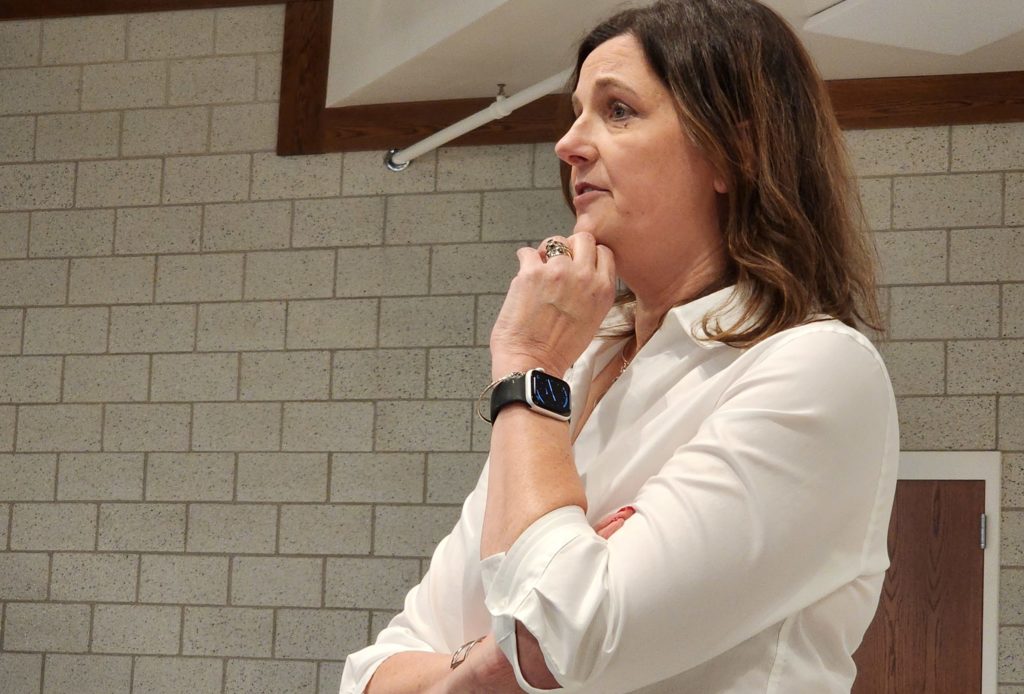
The last finalist to speak was Kimberly Brueck, who graduated from BGHS in 1986, then from BGSU in 1990. She came with her old tennis uniform, stories of singing in the school choir, and her fond memories of the community.
“It’s time to come home and give back to the place that made me who I am,” she said.
Brueck started her career in education as a French and English teacher for 20 years at Cuyahoga Falls High School. She then became an instructional coach for eight years, helping teachers integrate technology into their classrooms. For the past nine years, she has been director of teaching and learning at Green Local Schools.
Breuck told of her district not passing a levy for new money in nine years, and facing the possible layoff of 75 of 250 teachers. She spoke with sadness about the potential loss of top notch teachers. The district was honest with voters about the layoffs and the condition of the buildings.
“People need to know it costs a crazy amount of money to operate an old building,” she said.
The district shared how new school buildings will positively impact property values.
“We talked to the community. We listened to the community,” she said.
The district discovered it wasn’t senior citizens on fixed incomes who were voting against school levies. And they determined that only 25% of school parents were registered to vote. So they held a voter registration drive.
“We passed that levy by 56%,” Brueck said. And the last operating levy renewal passed by 70%.
Also, the relationship between the school district and the city changed. The relationship is so good between the City of Green and the schools that the two entities share a facility for the administrative offices, she said.
“We work in concert with the community,” she said.
“When I read about what Bowling Green is going through right now, I realized, maybe it’s time for me to come home. I’m a hometown girl and I want to come home and help,” she said.
Green Schools is in the process of consolidating its five buildings into four.
“I’m not saying that’s a solution for Bowling Green, but I’m saying you need to talk about it.”
“It’s imperative to reach out to the community and have conversations,” then take that information back to share with the school board, she added.
Much of Brueck’s conversation with the community on Wednesday focused on advocacy and support of students.
“Don’t tell me children with disabilities should be in a separate classroom,” she said. “Kids should learn at their pace.”
Her district operates with several “coaches” working with students and staff. “We’re all on the same team.”
Brueck also talked about the need for arts in schools.
“The arts are critical to the success of every child. They fill a need for children who may not necessarily be the smartest kids,” she said. “Music and art make kids smarter.”
At a time when some districts are eliminating the arts because of budget cuts, Brueck said arts should be expanded.

